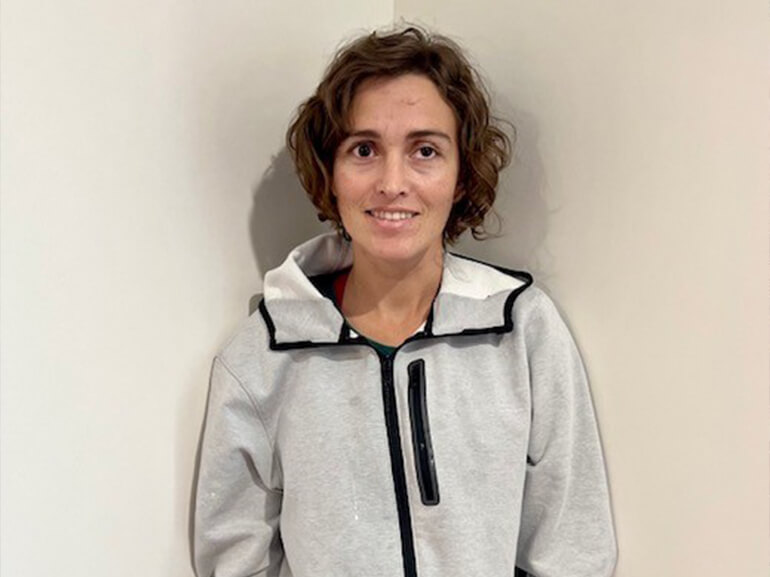Rhoda's Story

A native of Lake Havasu, Arizona, Rhoda Ellis, 32, is a married stay-at-home mother and part-time housecleaner. She enjoys painting, hiking, gardening and spending time outside. Her life changed dramatically one October day when a car ran a red light and t-boned her vehicle. Rhoda’s young daughter, who was in the back seat, was unharmed, but Rhoda suffered a traumatic brain injury, intracranial hemorrhage (a brain bleed) and a broken pelvis.
Rhoda was airlifted to the emergency room at Sunrise Hospital where she spent four days on a ventilator. She also had a feeding tube placed and underwent surgery for her broken pelvis, which required the placement of percutaneous fixation, a surgical procedure that inserts implants to stabilize the broken bones. Rhoda has no memory of the accident and doesn’t recall much of the three weeks she spent in the hospital. Once medically stable, Rhoda was transferred to Dignity Health Rehabilitation Hospital to begin her recovery.
Upon arriving Rhoda recalls, “The left side of my body didn’t work very well, so I had to relearn how to walk, how to sit up and how to eat.” This, combined with her traumatic brain injury and time in the acute care hospital had left her extremely weak. Rhoda, who had been totally independent before the accident, now needed assistance to perform her personal care and get in and out of bed. She was unable to sit, stand or walk without support and could not eat or drink by mouth as she still had a feeding tube supplying all of her nourishment and medication. Rhoda’s memory, vision and problem-solving abilities were impacted as well.
Rhoda’s goals for her time at Dignity Health Rehabilitation Hospital were “to learn to walk again and talk better,” while her husband’s goals for her were to “get her life back to some level of normalcy.” Rhoda’s physician-led team of nurses and physical, occupational and speech therapists created a plan for her recovery.
Physical therapists worked with Rhoda on improving her balance and endurance so that she could walk independently again. “Rhoda’s favorite exercise was walking, even when it was really hard and she needed a lot of help,” her therapist said, adding, “She would always find the energy to try walking even if it was the end of the session and she was already tired.” Rhoda’s walking significantly improved as she got stronger and practiced more frequently. Toward the end of her stay, therapists used the Bioness L300, an electrical stimulation unit, to further improve her walking mechanics. This helped Rhoda progress to using a rolling walker. On the day she was discharged, Rhoda was able to use the rolling walker to walk from her room, through the hospital and out the front door with only supervision.
In occupational therapy, Rhoda and her therapists focused on improving strength and coordination of her left arm. Electrical stimulation was used to activate her muscles in addition to using a variety of range of motion exercises, stretching and strengthening techniques. As the use of her left arm returned, Rhoda progressed to being able to dress herself, transfer, get in/out of bed, walk around with her rollator and complete simulated home management tasks. In time, Rhoda was able to flex her shoulder, bend her elbow/wrist, turn her hand up/down and reaching for items. Her therapists also worked on Rhoda’s vision challenges, which included double vision. Her family also assisted in this area by doing the vision exercises with Rhoda outside of her regular therapy sessions.
Speech therapists assisted Rhoda with her ability to eat and drink. After conducting swallow studies to determine the severity of her dysphagia, or swallowing impairment, they guided Rhoda in swallowing exercises. As Rhoda’s ability to swallow gradually improved, she went from eating pureed food and drinking moderately thickened liquids to safely eating regular textured food and thin liquids.
Rhoda’s family was heavily involved and supportive throughout her recovery. Either her husband or mother-in-law were with her every single day of her stay. They kept her company, provided motivation and encouragement and participated in family training to learn how to better help her continued recovery at home. Rhoda’s sister and daughter would visit when they could as well and Rhoda “lit up with joy every time her sister came to see her.”
After six weeks at Dignity Health Rehabilitation Hospital, Rhoda was excited to return home to her family and continue her recovery with Dignity Health’s neurological outpatient therapy. When asked what she had learned about herself during the rehabilitation process, Rhoda said, “I have realized that no matter what happens to you, you can overcome it if you have the determination to do so. I progressed because I did my exercises even when no one was here to make me. I did them willingly even when I was not being watched.”
Rhoda gives high praise to her therapy team, saying, “I enjoyed everything that my therapists asked me to do. They taught me to walk and balance again. Occupational therapy helped me re-learn how to do the things I need to do as a wife and mom. I had very good therapists all the way around.”